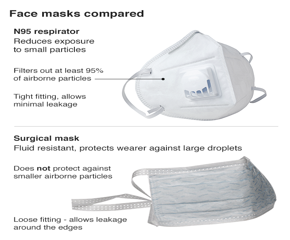Weekly Current Affairs: April week-2 - Should one wear mask to prevent Coronavirus? The answer may be changing
The World Health Organisation (WHO) indicated for the first time it might revise guidelines on wearing masks in public amid the novel coronavirus disease (COVID-19) pandemic. Soon after, United States’ Centers for Disease Control and Prevention (CDC) recommended the use masks even for those not unwell or caregivers.
Context
The World Health Organisation (WHO) indicated for the first time it might revise guidelines on wearing masks in public amid the novel coronavirus disease (COVID-19) pandemic. Soon after, United States’ Centers for Disease Control and Prevention (CDC) recommended the use masks even for those not unwell or caregivers.
Background:
- Since the beginning of the global coronavirus pandemic, the Centers for Disease Control and Prevention have recommended not to wear masks unless one is feeling sick, caring for a sick person who is unable to wear one or working in health care.
- Now there are big changes to that policy.
- The CDC is now recommending people consider wearing cloth face coverings in public settings where other social distancing measures are difficult to maintain.
- There's one big reason for the change: There is increasing evidence that the virus can be spread by presymptomatic and asymptomatic carriers.
- Some countries, including Austria, Slovakia and the Czech Republic, have made masks mandatory.
- The Indian Council of Medical Research has not yet recommended wearing masks in public.
- WHO had maintained since the pandemic broke that only the sick, caregivers and frontline healthcare workers needed to put on masks to protect themselves against the SARS-CoV-2 virus.
Analysis
What is Coronavirus?
- Coronavirus disease (COVID-19) is an infectious disease caused by a newly discovered coronavirus.
- Coronaviruses are a large family of viruses which may cause illness in animals or humans.
- In humans, several coronaviruses are known to cause respiratory infections ranging from the common cold to more severe diseases such as Middle East Respiratory Syndrome (MERS) and Severe Acute Respiratory Syndrome (SARS).
- The most recently discovered coronavirus causes coronavirus disease COVID-19.
- This new virus and disease were unknown before the outbreak began in Wuhan, China, in December 2019.
- Most people infected with the COVID-19 virus will experience mild to moderate respiratory illness and recover without requiring special treatment.
What are the symptoms?
- The most common symptoms of COVID-19 are fever, tiredness, and dry cough. Some patients may have aches and pains, nasal congestion, runny nose, sore throat or diarrhea.
- These symptoms are usually mild and begin gradually. Some people become infected but don’t develop any symptoms and don't feel unwell.
- Most people (about 80%) recover from the disease without needing special treatment.
- Around 1 out of every 6 people who gets COVID-19 becomes seriously ill and develops difficulty breathing.
Who are at risk?
- Older people, and those with underlying medical problems like cardiovascular disease, diabetes, chronic respiratory disease, and cancer are more likely to develop serious illness.
How to prevent it?
- The best way to prevent and slow down transmission is be well informed about the COVID-19 virus, the disease it causes and how it spreads.
- Protect yourself and others from infection by washing your hands or using an alcohol based rub frequently and not touching your face.
How does the ‘virus’ spread?
- The COVID-19 virus spreads primarily through droplets of saliva or discharge from the nose when an infected person coughs or sneezes, so it’s important that you also practice respiratory etiquette (for example, by coughing into a flexed elbow).
Are there any vaccines available?
- At this time, there are no specific vaccines or treatments for COVID-19.
- However, there are many ongoing clinical trials evaluating potential treatments.
Is Coronavirus the same as SARS?
- The virus that causes COVID-19 and the one that caused the outbreak of Severe Acute Respiratory Syndrome (SARS) are related to each other genetically, but the diseases they cause are quite different.
- Severe acute respiratory syndrome (SARS) is a viral respiratory illness caused by a coronavirus called SARS-associated coronavirus (SARS-CoV).
- SARS was first reported in Asia in February 2003. The illness spread to more than two dozen countries in North America, South America, Europe, and Asia before the SARS global outbreak of 2003 was contained.
- SARS was more deadly but much less infectious than COVID-19. There have been no outbreaks of SARS anywhere in the world since 2003.
Why CDC is now recommending mask?
- Recent studies showed a significant number of asymptomatic or pre-symptomatic people could transmit the virus to others before showing symptoms. This can happen through speaking, coughing or sneezing.
- According to the US health protection agency’s revised guidelines:
- In light of this new evidence, CDC recommends wearing cloth face coverings in public settings where other social distancing measures are difficult to maintain (eg, grocery stores and pharmacies) especially in areas of significant community-based transmission.
- The public in general, however, did not need N95 masks or surgical masks.
- Common people, instead, should use cloth-based or homemade masks.
- Cloth face coverings made from household items or made at home from common materials at low cost can be used as additional measure.
Why earlier masks were not recommended?
- Masks are not recommended for the general public because:
- they can be contaminated by other people's coughs and sneezes or when putting them on or removing them
- frequent hand-washing and social distancing are more effective
- they might offer a false sense of security
- Coronavirus is spread by droplets that can spray into the air when those infected talk, cough and sneeze. These can enter the body through the eyes, nose and mouth, either directly or after touching a contaminated object.
- However, experts at the WHO are now exploring whether the general public might benefit from wearing masks.
- The group will examine research on whether the virus can be projected further than previously thought.
What is the best type of mask?
- In hospitals, different types of mask offer different grades of protection.
- The most protective, an FFP3 or, alternatively, an N95 or an FFP2, has a fitted respirator that filters air.
- Experts do not recommend the public use these masks.
- They are for healthcare workers in close contact with coronavirus patients and at highest risk of encountering infected airborne droplets.
- Other NHS staff in lower-risk situationscan wear a surgical mask, latest guidelines say.
- That means healthcare workers within one metre of a patient with possible or confirmed Covid-19, and it includes staff working in hospitals, primary care, ambulance trusts, community care settings and care homes.
Conclusion:
Face masks have become a hotly debated topic in the time of the coronavirus pandemic. Fears over developing COVID-19, the respiratory illness the virus causes, led people to hoard masks earlier this year, leading to significant shortages for medical workers. The CDC new recommendation






